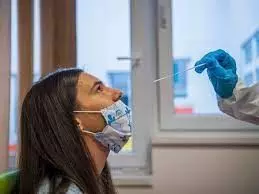
Study finds elusive virus in testing in COVID infected people
text_fieldsScientists have found that a part of the population is experiencing "abortive infection" that is causing them to test negative for Covid-19 despite their living companions receiving a positive result.
Research has found that when the coronavirus enters the body, it is immediately dealt with by the T-cells in the immune system. Since the virus is killed off at the earliest stage, it does not show up in the RT-PCR or antigen tests reported by The Guardian.
The lead author of the study and an immunologist at University College London, Leo Swadling said that until now, they did not know whether some people completely avoided the virus or they naturally cleared the virus before being detectable.
About 15% of the health workers in London seem to have undergone aStudy finds elusive virus in COVID infected peopleortive infections. They were tracked during the first wave of the pandemic. 58 health workers observed by the team did not test positive for Covid-19 at any point despite being in an environment with a high risk of exposure. But, their blood samples showed an increase in T-cells.
Experts are hoping that the discovery may lead to new vaccines that target the T-cell response and provide lasting immunity. A subset of people also had memory T-cells from previous infections which protected them from coronavirus. This includes other seasonal coronaviruses causing common colds.
Swadling told The Guardian that the T-cells detect proteins in the replication machinery of the seasonal coronaviruses and respond quickly to the infection. These immune cells are ready to recognise SARS-CoV-2.
The new study says that the T-cells may be able to offer protection for years rather than months. Antibodies are likely to wane after a few months. Similarly, most of the Covid-19 vaccines are aiming to prepare antibodies to deal with the spike protein of coronavirus.
























